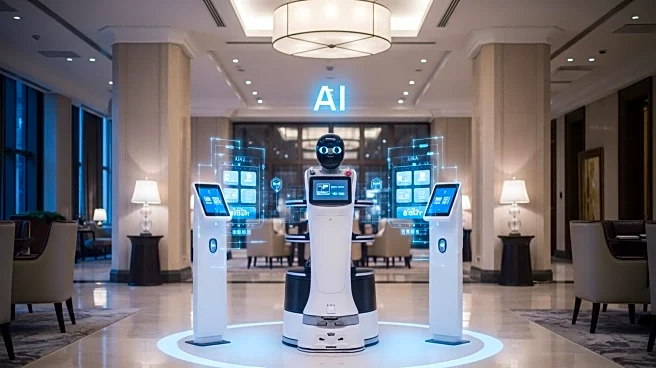What is the story about?
What's Happening?
The hospitality industry is undergoing a significant transformation with the integration of artificial intelligence (AI) technologies. AI is becoming a fundamental part of hotel operations, influencing everything from guest interactions to revenue management. The technology is already embedded in various tools used daily, such as dynamic pricing models and fraud prevention systems. OpenAI's collaboration with Stripe has introduced the Agentic Commerce Protocol, enabling seamless transactions within conversational interfaces. This allows guests to book hotels, make payments, and personalize their stays through AI-driven interactions without visiting traditional websites or calling reservation lines. Major online travel agencies like Booking.com, Expedia, and Airbnb are also adopting AI-powered trip planners, which act as personal travel agents, offering tailored recommendations based on user preferences.
Why It's Important?
The integration of AI in the hospitality sector is crucial as it enhances operational efficiency and guest satisfaction. By automating routine tasks and providing personalized experiences, hotels can allocate human resources to more creative and empathetic roles. This shift not only optimizes revenue management but also redefines guest engagement, making interactions more intuitive and responsive. The ability of AI to process vast amounts of data in real-time allows hotels to anticipate guest needs and adjust pricing dynamically, leading to improved occupancy rates and profitability. As AI systems become more conversational and visible, they offer a competitive edge to hotels that embrace this technology, potentially reshaping the industry's landscape.
What's Next?
The future of hospitality will likely see further integration of AI systems, with hotels increasingly relying on these technologies for decision-making and guest interactions. As AI becomes more prevalent, hotels will need to ensure their data is structured and accessible to maintain visibility in AI-driven discovery processes. The role of hotel staff will evolve, focusing on collaboration with AI systems to enhance guest experiences. Additionally, the industry may witness a shift in marketing strategies, as AI-driven platforms become the primary means of guest engagement and booking. Hotels that adapt to these changes will be better positioned to thrive in an AI-centric environment.
Beyond the Headlines
The adoption of AI in hospitality raises ethical and cultural considerations, particularly regarding data privacy and the human element in guest interactions. As AI systems handle more personal data, hotels must prioritize data security and transparency to maintain guest trust. Furthermore, the shift towards AI-driven operations challenges traditional notions of hospitality, emphasizing the need for a balance between technological efficiency and human connection. This transformation invites reflection on the essence of hospitality and the role of human creativity and empathy in an increasingly automated world.















